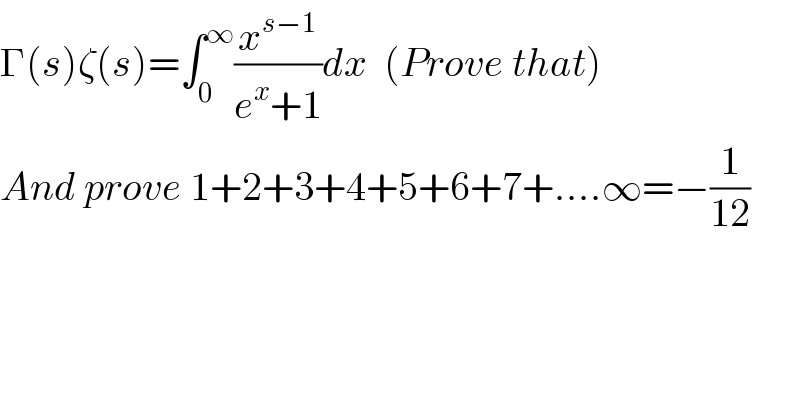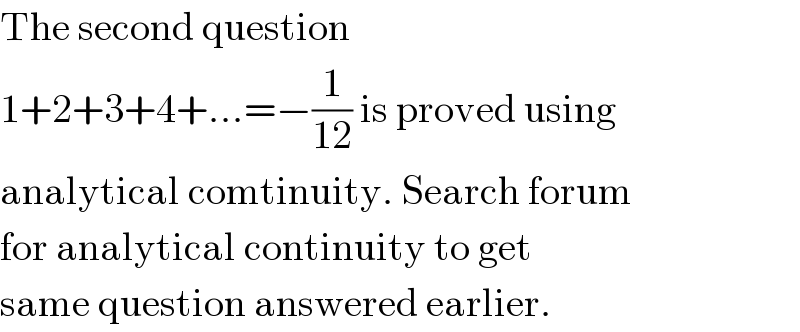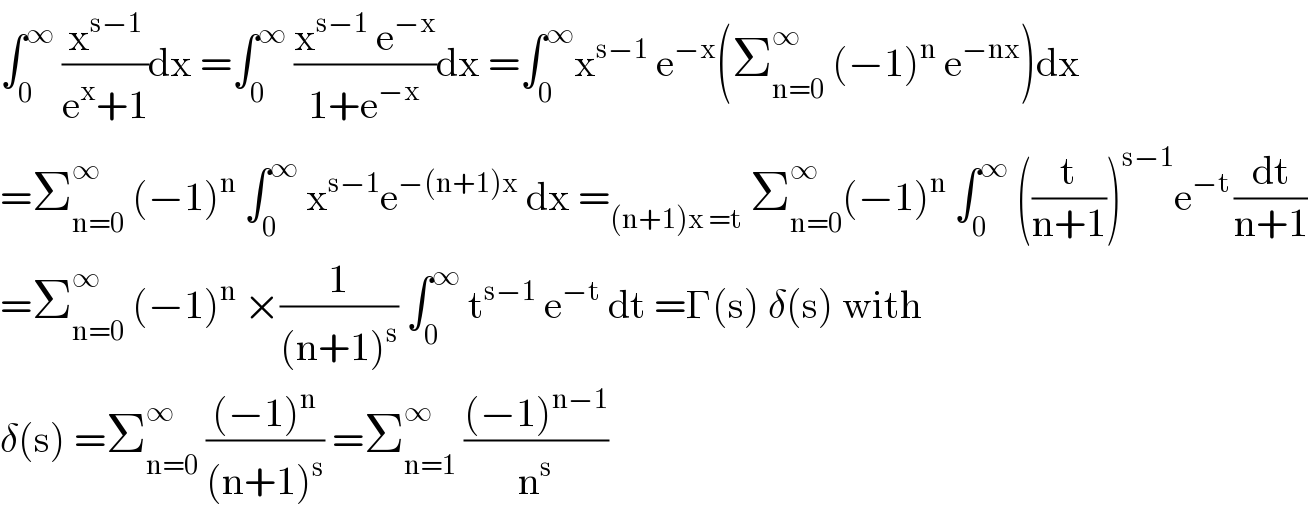
Question Number 102115 by Dwaipayan Shikari last updated on 06/Jul/20

$$\Gamma\left({s}\right)\zeta\left({s}\right)=\int_{\mathrm{0}} ^{\infty} \frac{{x}^{{s}−\mathrm{1}} }{{e}^{{x}} +\mathrm{1}}{dx}\:\:\left({Prove}\:{that}\right) \\ $$$${And}\:{prove}\:\mathrm{1}+\mathrm{2}+\mathrm{3}+\mathrm{4}+\mathrm{5}+\mathrm{6}+\mathrm{7}+....\infty=−\frac{\mathrm{1}}{\mathrm{12}} \\ $$$$ \\ $$
Commented by mr W last updated on 06/Jul/20

$${do}\:{you}\:{learn}\:{these}\:{things}\:{in}\:{your} \\ $$$${high}\:{school}\:{really}? \\ $$
Commented by prakash jain last updated on 07/Jul/20

$$\mathrm{The}\:\mathrm{second}\:\mathrm{question}\: \\ $$$$\mathrm{1}+\mathrm{2}+\mathrm{3}+\mathrm{4}+...=−\frac{\mathrm{1}}{\mathrm{12}}\:\mathrm{is}\:\mathrm{proved}\:\mathrm{using} \\ $$$$\mathrm{analytical}\:\mathrm{comtinuity}.\:\mathrm{Search}\:\mathrm{forum} \\ $$$$\mathrm{for}\:\mathrm{analytical}\:\mathrm{continuity}\:\mathrm{to}\:\mathrm{get} \\ $$$$\mathrm{same}\:\mathrm{question}\:\mathrm{answered}\:\mathrm{earlier}. \\ $$
Commented by Dwaipayan Shikari last updated on 07/Jul/20

$${No}\:{sir}.\:{Curiosity} \\ $$
Answered by mathmax by abdo last updated on 06/Jul/20

$$\mathrm{the}\:\:\mathrm{question}\:\left(\mathrm{1}\right)\mathrm{is}\:\mathrm{done}\:\mathrm{see}\:\mathrm{the}\:\mathrm{platform} \\ $$
Answered by mathmax by abdo last updated on 08/Jul/20

$$\int_{\mathrm{0}} ^{\infty} \:\frac{\mathrm{x}^{\mathrm{s}−\mathrm{1}} }{\mathrm{e}^{\mathrm{x}} +\mathrm{1}}\mathrm{dx}\:=\int_{\mathrm{0}} ^{\infty} \:\frac{\mathrm{x}^{\mathrm{s}−\mathrm{1}} \:\mathrm{e}^{−\mathrm{x}} }{\mathrm{1}+\mathrm{e}^{−\mathrm{x}} }\mathrm{dx}\:=\int_{\mathrm{0}} ^{\infty} \mathrm{x}^{\mathrm{s}−\mathrm{1}} \:\mathrm{e}^{−\mathrm{x}} \left(\sum_{\mathrm{n}=\mathrm{0}} ^{\infty} \:\left(−\mathrm{1}\right)^{\mathrm{n}} \:\mathrm{e}^{−\mathrm{nx}} \right)\mathrm{dx} \\ $$$$=\sum_{\mathrm{n}=\mathrm{0}} ^{\infty} \:\left(−\mathrm{1}\right)^{\mathrm{n}} \:\int_{\mathrm{0}} ^{\infty} \:\mathrm{x}^{\mathrm{s}−\mathrm{1}} \mathrm{e}^{−\left(\mathrm{n}+\mathrm{1}\right)\mathrm{x}} \:\mathrm{dx}\:=_{\left(\mathrm{n}+\mathrm{1}\right)\mathrm{x}\:=\mathrm{t}} \:\sum_{\mathrm{n}=\mathrm{0}} ^{\infty\:} \left(−\mathrm{1}\right)^{\mathrm{n}} \:\int_{\mathrm{0}} ^{\infty} \:\left(\frac{\mathrm{t}}{\mathrm{n}+\mathrm{1}}\right)^{\mathrm{s}−\mathrm{1}} \mathrm{e}^{−\mathrm{t}\:} \frac{\mathrm{dt}}{\mathrm{n}+\mathrm{1}} \\ $$$$=\sum_{\mathrm{n}=\mathrm{0}} ^{\infty} \:\left(−\mathrm{1}\right)^{\mathrm{n}} \:×\frac{\mathrm{1}}{\left(\mathrm{n}+\mathrm{1}\right)^{\mathrm{s}} }\:\int_{\mathrm{0}} ^{\infty} \:\mathrm{t}^{\mathrm{s}−\mathrm{1}} \:\mathrm{e}^{−\mathrm{t}} \:\mathrm{dt}\:=\Gamma\left(\mathrm{s}\right)\:\delta\left(\mathrm{s}\right)\:\mathrm{with} \\ $$$$\delta\left(\mathrm{s}\right)\:=\sum_{\mathrm{n}=\mathrm{0}} ^{\infty} \:\frac{\left(−\mathrm{1}\right)^{\mathrm{n}} }{\left(\mathrm{n}+\mathrm{1}\right)^{\mathrm{s}} }\:=\sum_{\mathrm{n}=\mathrm{1}} ^{\infty} \:\frac{\left(−\mathrm{1}\right)^{\mathrm{n}−\mathrm{1}} }{\mathrm{n}^{\mathrm{s}} } \\ $$
Answered by mathmax by abdo last updated on 08/Jul/20

$$\mathrm{1}+\mathrm{2}+\mathrm{3}+....=−\frac{\mathrm{1}}{\mathrm{12}}\:\mathrm{is}\:\mathrm{a}\:\mathrm{no}\:\mathrm{sense}\:\mathrm{because}\:\mathrm{1}+\mathrm{2}+\mathrm{3}\:+....>\mathrm{0}\:\mathrm{and}\:−\frac{\mathrm{1}}{\mathrm{12}}<\mathrm{0} \\ $$$$\mathrm{from}\:\mathrm{where}\:\mathrm{come}\:\mathrm{be}\:\mathrm{equality}... \\ $$
